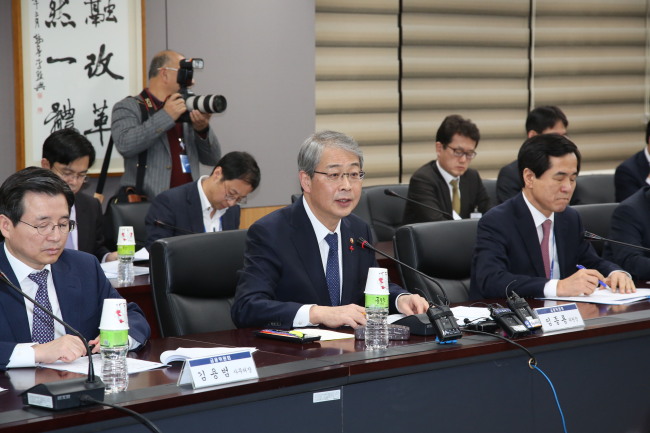 |
FSC Chairman Yim Jong-yong (middle) speaks at a meeting on reviewing microfinance programs at the Seoul government complex in Gwanghwamun on Wednesday. (FSC) |
South Korean shares on Wednesday showed mixed reactions to the expected rate decisions by Washington and Seoul on Thursday, while the country’s financial authorities braced for possible impact on the market.
Seoul’s main bourse Kospi opened above the 2,040 mark in the early morning largely due to overnight gains on Wall Street, but it headed south later in the morning, shaving around 2 percent as investors here took a wait-and-see stance about rate decisions by the Federal Reserve early Thursday and the Bank of Korea later in the day.
The Kospi recovered 0.04 percent to close at 2,036.87.
Large-cap stocks were mixed across the board, with market bellwether Samsung Electronics gaining 0.62 percent and Hyundai Motor falling 1.03 percent.
According to market watchers, institutional investors that remained cautious about the rate decisions led sell-offs of local shares, causing some large-caps to slide.
While anticipation was high for the US Fed to raise its fund rate by 25 basis points among investors, a freeze seems highly likely for the Korean benchmark interest rate, which caused the Kospi to experience some falls, according to analysts.
“The Kospi may try rebounding after the Fed decision,” said Lee Joon-hee, an analyst at NH Investment & Securities. “Conditions surrounding the Kospi have improved much after the presidential impeachment vote, bringing foreign investors back to the market. The Kospi could rally after the Fed decision based on investors’ expectations on the recovering US and Chinese economy and improvements in some local corporate performances in the fourth quarter.”
A US rate increase, however, can be a burden to the Korean financial market, as the rate hike would lead to a stronger US dollar and possible capital outflows from emerging markets including Korea, some economists said.
“If the dollar keeps strengthening until early next year, Korean stocks would need more appealing factors to attract foreign capital,” said Kim Han-jin, a senior economist at KTB Investment & Securities. “For the time being, the Korean stock index may stay relatively lower, but industrial conditions and corporate performances could help some individual stocks buoy.”
Against this backdrop, the country’s financial regulator announced it will expand supply for microfinance programs for the working class from the current 5.7 trillion won ($4.87 billion) to 7 trillion won next year.
“The government will increase the supply for four state-run microfinance programs next year in order to help low-income households borrow loans at affordable costs,” said Yim Jong-yong, chairman of the Financial Services Commission.
About 670,000 individuals can apply for the programs next year, the FSC estimated. (
song@heraldcorp.com)








